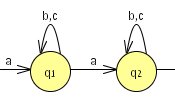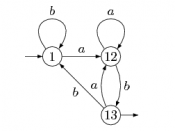Deterministic Automata and Freewill In the Christian understanding, one of the most fundamental aspects of persons is that we have Freewill. Created in the image of God, who is perfectly free, we are granted the inestimable gift of Freewill because it is logically necessary to love, since love is the orientation of your Freewill to the true well-being of the beloved.
The creation by an omnipotent benevolent creator of the present universe with its messy and contingent nature, and with the evil and suffering, can only be understood on the basis that the suffering is logically necessary in order to allow Freewill.
Clearly, unlike God, we are by no means perfectly free: we are constrained by physics, biology and often by economics and psychology. Nevertheless, for a Christian, the fact that humans have Freewill is central to what it means to be a person.
Freewill is a fundamental category of personhood.
To have Freewill it is a necessary, but not sufficient, condition, that there are some free situations where it is possible for you to choose between two or more courses of action: it is possible to guess which choice you might take but impossible in principle to predict it with certainty until you have made it, even given the most complete knowledge logically possible of your current state and all the inputs you are receiving to help you make up your mind. In particular there cannot be a logical system which, given a precise description of your situation will deduce with certainty what your choice will be.
A deterministic automaton can be defined as a system with a well-defined state, a set of inputs, and a finite set of logical decision rules L which allow the next state to be deduced with certainty given knowledge of the current state and the inputs.
Clearly no deterministic automaton can have any free situations and therefore no deterministic automaton can have Freewill.
It obviously might be possible to construct a sufficiently complicated deterministic automaton which could deceive an outward observer of its behaviour into thinking that it has Freewill, especially if artificial restrictions were placed on the kinds of observations an observer could make. But in Philosophy there are all kinds of hypothetical situations in which it might be difficult to distinguish between A and B. This does not alter the logical point that a deterministic automaton does not have Freewill1 .
It is often suggested that, because the brain is composed of neurones which are subject to deterministic physical laws, the brain itself must operate in a deterministic manner, and thus in some sense be a deterministic automaton. However this argument is quite fallacious. Firstly, all the factors relevant to the operation of the brain are by no means understood2 nor is it at all clear that the laws of physics which govern them are really deterministic3. But secondly, it is now known that almost all complex analogue systems with non-linear interactions are non-deterministic, even if all the components are subject to deterministic laws.
Ilya Prigogine is one of the leading investigators of these questions, which are a direct extension of his Nobel Prize-winning work on thermodynamics. In his book The End of Certainty he explains that this is because such systems exhibit "ÃÂPoincarÃÂé resonances' where attempts to solve the equations for their behaviour encounter terms of the form 1/(n1f1 - n2f2) which become undefined when n1f2 = n2f1. Systems with many such resonances are called Large PoincarÃÂé Systems (LPSs) and are known to be non-deterministic. The number of PoincarÃÂé resonances increases with the number of interactions in the system: at a conservative estimate each of the 1010 neurones in the brain interacts directly with 5-100 others which means that there are about 1010,000,000,000 such interactions (a number astronomically larger than the total number of atoms in the universe): the human brain is clearly a Large PoincarÃÂé System. Consequently it can be stated with mathematical certainty that even if the behaviour of all the individual components of the brain were completely deterministic (which is far from certain) the behaviour of the human brain as a whole would still not be deterministic4.
It is also worth noting that the non-determinism of the LPS is a property of the system as a whole: it is not a question of having a deterministic system with a few random inputs, which could conceptually be isolated from the rest of the system.
It might be imagined that, even though the brain is a LPS, it could be simulated with sufficient accuracy by a suitably powerful automaton "ÃÂ after all LPSs are regularly studied by computer simulations. However LPSs exhibit large Lyapunov exponents which means that a small error in knowledge of conditions at time t0 grows exponentially as ek(t-t0). Thus regardless of how accurately the initial conditions are represented in a digital simulation, divergences between the simulation and the real world become arbitrarily large, and grow quickly. John Polkinghorne illustrates this kind of behaviour nicely with the example of a single molecule of air in a room: even if you knew its position and momentum exactly and that of all the molecules with which it is liable to collide, and even if the collisions are totally deterministic, after 10-10 seconds its position is un-knowable5 .
In addition Lucas's Theorem proves that no mathematical logician capable of understanding Godel's theorem (with or without the aid of a sufficiently powerful computer) can be, or be predicted by, a deterministic automaton. Proponents of the "ÃÂbrain=automaton' dogma are thus reduced to arguing that no human being is a mathematical logician capable of understanding Godel's theorem (with or without the aid of a sufficiently powerful computer) for which there is no evidence other than that the existence of such people undermines the brain=automaton dogma.
Although this discussion shows that no deterministic automaton can have freewill, and that humans are not deterministic automata, it does not negate the logical possibility that "ÃÂartificial' persons could be created. After all, in vitro fertilisation is now routinely practised, and it seems highly probable that there are no fundamental technical obstacles to the production of human beings through a combination of genetic engineering and cloning who have no genetic parents in a normal sense. It is perhaps logically conceivable that other forms of "ÃÂartificial persons' could be produced, but, unlike all current computers, they would certainly not be deterministic automata.
Back to Star Course Leading Scientists on Science & Religion Discussion Bibliography Notes 1. If one of two identical twins commits a crime, both have equal opportunity and neither has an alibi, it may be impossible for an outside observer after the event to tell which did the deed. This does not alter the fact that one is the perpetrator, and the other is not.
2. To give one simple example - it is widely believed that prions cause KJD, but no-one knows how: 20 years ago the existence of prions was un-suspected. There will almost certainly be discoveries of new entities relevant to the operation of the brain whose existence is currently un-suspected.
3. Although the Dirac equation is deterministic the probabilistic behaviour of quantum measurements is incontrovertible: no-one knows how to reconcile these two in detail but it is clear that the eventual result will be something that takes the empirically observed quantum indeterminacy seriously.
4 BTW I believe that such systems often behave more stably if their components are slightly non-deterministic.
5 See eg Science and Theology (1998) pp41-42.





